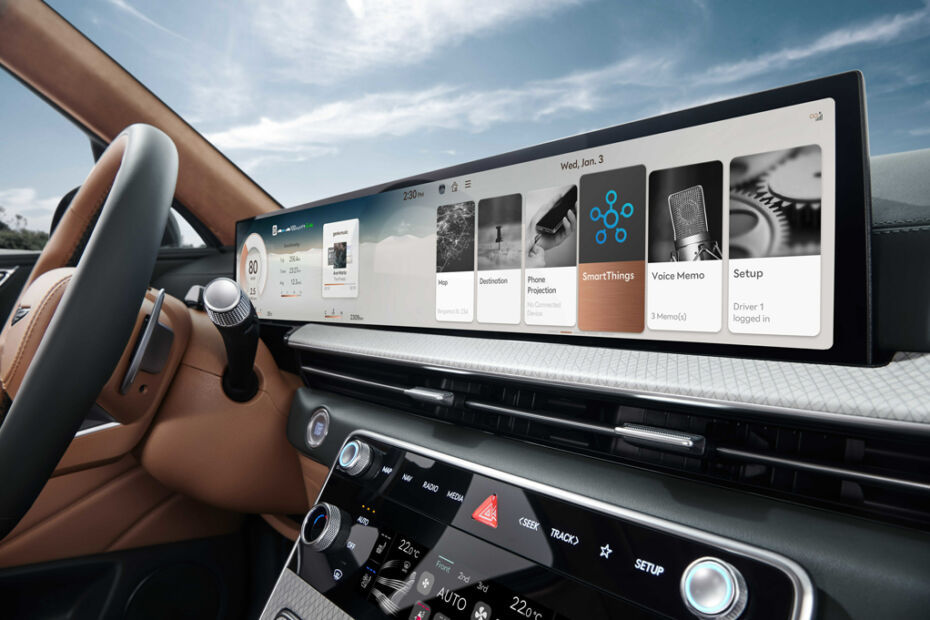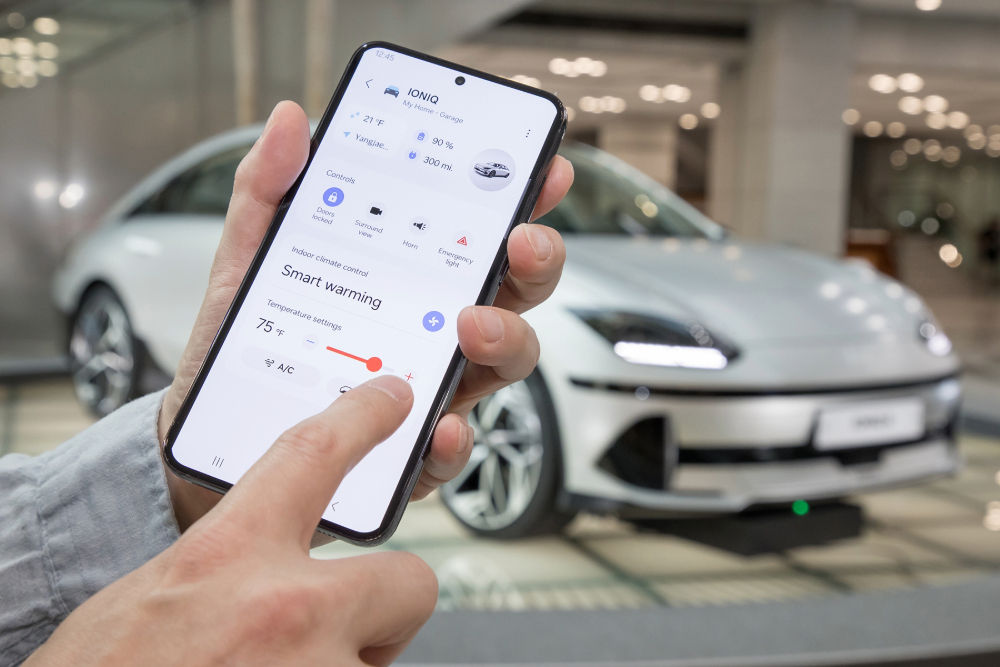Samsung has been developing its own home automation system called SmartThings for years. In 2020, Samsung told that the system had been integrated with Mercedes car computers, and in 2023 it was compatible with Matter standard that aims at making home gadgets communicate better with other manufacturers’ devices. Now, in 2024, Samsung said that two car manufacturers, Hyundai/Kia and Tesla, have agreed to connect their car computer systems to the Samsung SmartThings. Cool achievement, but what does it mean in practice?
It is possible to connect lightbulbs, thermostats, security cameras, phones and other IoT (Internet of Things) home devices to a Samsung Smartthings system. A central control device, Station, is connected to all devices so that it knows their status. The home owner has a phone where an app can be used to monitor events at home and adjust settings if needed.
The manufacturers of Hyundai and Kia vehicles have also seen an opportunity years ago to create new functionality for their cars. They have already provided services that connect new car models to home automation systems. They have achieved this by partnering with telecommunication companies and construction companies. The available functionality includes controlling home lights, ventilation, air conditioning and boilers from a car. From home, it is possible to control air conditioning, remote starting, and charging of Hyundai and Kia cars. The co-operation with Samsung will introduce new functions, like starting a robot that vacuums floors at home from a car. Yes, really.
Tesla electric vehicles are widely known as computers on wheels. In addition to cars, Tesla has made products available for home use, like a home battery product, Powerwall, and a home charging station. Now, Samsung is creating integration between the Smartthings home system and the Tesla Powerwall, as well as the electric vehicle home charging point.
So, Samsung, Hyundai, Kia and Tesla have agreed that it makes our lives better when cars are connected to home automation systems, and we can give a voice command – while driving – to turn on lights at home. Or when we are sipping morning coffee in the kitchen, we can tell the home automation system to turn on air conditioning in the car.
Fine, the key benefit of the technology seems to be convenience. Certainly, there are people who are willing to pay for that kind of convenience. My concerns, however, are security, privacy and creating additional network access points that are open to the world, when we already have phones that can do the same.

Security
Home automation devices have a terrible track record with cybersecurity. Products may have default passwords that can’t be changed, and they are accessible to the worldwide internet. In general, security experts agree that home automation gadgets should be isolated into a subnetwork within a home network. Computers, phones and tablets used at home should have a separate subnet. This setup ensures that even if, for instance, a lightbulb is hacked and misused for shady operations, hackers haven’t achieved access to the subnet where home computers and phones are communicating.
When the computer system in a car is connected to a home network, the car is always waiting for commands from home, and the home network is continuously waiting for commands from the car. If and when someone manages to break into home network or into the car, it is possible to break into the other one as well. Surely, Samsung and car manufacturers will protect their products the best they can, but hacks happen.
Privacy
It has been public knowledge for years that social media services, like Facebook, Youtube and TikTok collect vast amounts of personal data from users. Lately, legislation has caught up with the privacy-breaching practice in Europe, giving people ways to refuse data collection. Now, there is a new king in the behind-the-scenes data collection business: car manufacturers. Recently, Mozilla studied 25 car brands, and concluded that the auto industry is a privacy nightmare. Everything from drivers health data to financial information is collected and sold to the adtech industry. Automakers also collect data from engine, brakes, and can pinpoint vehicle location and profile driving habits.
From privacy perspective, what happens when you connect the car computer system to your home network? Perhaps it is not only the car computer that tries to suck every piece of data from home, but the home control center is trying to do the same as well. The data is valuable for the manufacturers, and additional revenue stream if they decide to sell it to the advertising tech industry. The biggest concern from allowing businesses to collect, profile, and archive your personal data is the long term risk of someone exploiting your data for malicious actions.
Why not use a phone app instead?
Right now, without any further integration efforts, practically every home automation system and car computer has an app available for smartphones. Download the app and access your home control center or manage a number of functions in your car remotely. It works already. Most people carry their phone along everywhere. Yet, why are Samsung and car makers pushing car-to-home connection and home-to-car system connectivity?
Technology industry wants to be at the driver’s seat. For instance, Apple Carplay brings a number of iPhone apps to dashboards of many car brands. Google has created Android Auto that brings the functionality of driver’s Android phone to the dashboard. The prize for Apple and Google is the data. On the other hand, automakers believe there is valuable data in home automation systems that could benefit them.
Mozilla’s car privacy report on data collection reminds that the auto manufacturer’s app in many cases is a busy personal data hoarder. Users should avoid giving the app rights to access contacts, location, camera, and other personal information. But for controlling your home automation system or for managing your car functions, apps work.

